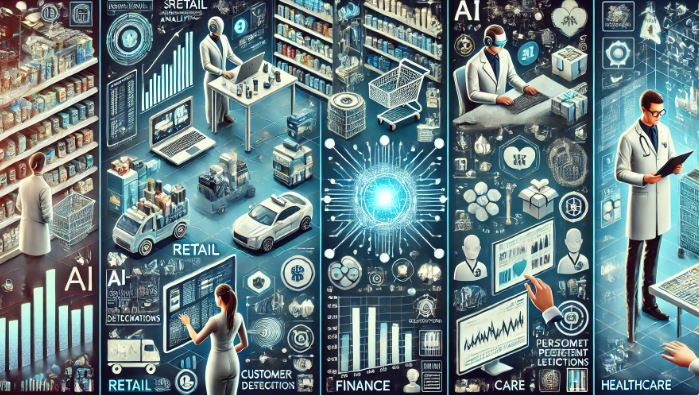Technology
AI Use Cases: Retail, Finance & Healthcare Solutions
Published
7 months agoon

Artificial intelligence (AI) is changing the world fast. It’s making big changes in retail, finance, and healthcare. AI brings new ideas, makes things more efficient, and helps focus on what customers want.
This article looks at how AI is changing three big areas: retail, finance, and healthcare. We’ll see how AI is making these fields better. It’s helping businesses work smarter, make customers happier, and stay on top of new trends.
AI is used in many ways, like predicting sales in retail and catching fraud in finance. It also helps doctors by analyzing images and improving care for patients. Let’s explore how AI is making a big difference in these important fields.
Understanding AI Implementation Across Industries
Artificial intelligence (AI) is changing many industries. Companies are looking to use AI to make better decisions and work more efficiently. They see AI as a way to use data to improve their operations.
AI is useful in many areas, like retail, finance, and healthcare. Each field uses AI in different ways. Knowing how AI works in these areas can help other companies use it better.
AI helps businesses make smarter choices. It uses data to find patterns and predict what will happen next. This way, companies can make better plans and stay ahead of the competition.
| Industry | Key AI Applications | Potential Benefits |
|---|---|---|
| Retail | Personalized product recommendations Predictive inventory management Automated customer service | Improved customer experience Optimized supply chain and inventory Enhanced operational efficiency |
| Finance | Risk assessment and fraud detection Automated trading and portfolio management Personalized financial planning | Reduced financial risk Improved investment performance Enhanced customer service |
| Healthcare | Predictive disease diagnosis Automated medical imaging analysis Personalized treatment recommendations | Improved patient outcomes Increased operational efficiency Enhanced clinical decision-making |
As AI use grows, companies must keep up with its challenges and best practices. By staying informed and flexible, they can use AI to innovate and stay competitive.
Top AI Use Cases for Retail, Finance, and Healthcare
Artificial Intelligence (AI) has changed how businesses work in many fields. Retail, finance, and healthcare are big winners. AI helps solve big problems and makes things better.

Machine Learning Applications
Machine learning is a key part of AI. It helps predict what will happen next. In retail, it looks at what customers buy and when. This helps keep the right amount of stock.
In finance, it spots risky loans and catches fraud. It also gives advice on investments. In healthcare, it finds diseases early and helps patients get better.
Natural Language Processing Solutions
Natural Language Processing (NLP) is another big help. In retail, chatbots talk to customers and help them buy things. In finance, it reads reports and news to find important info.
In healthcare, it makes medical notes easier to read. It helps doctors make better choices.
Computer Vision Technologies
Computer vision lets machines understand pictures and videos. It’s used a lot in these fields. In retail, it helps count stock and show products.
In finance, it checks who you are and spots fraud. In healthcare, it looks at scans to find diseases early.
AI is changing these industries in big ways. It’s all about making things better and more efficient. AI can help in many ways, from predicting what will happen to understanding language and images.
| Industry | AI Use Cases |
|---|---|
| Retail | Predictive analytics for inventory management Chatbots for customer service Computer vision for automated checkout and product visualization |
| Finance | Credit risk modeling and fraud detection Personalized investment recommendations Identity verification and remote asset monitoring |
| Healthcare | Early disease detection and patient outcome improvement Streamlining medical documentation and clinical decision-making Medical imaging analysis for accurate diagnosis |
AI-Powered Retail Revolution: Transforming Shopping Experience
The retail world is changing fast, thanks to AI. This new era is making shopping better and more fun for everyone.
Personalized recommendations are a big deal now. AI helps stores know what you like and suggest things just for you. This makes shopping more fun and helps stores sell more.
Virtual shopping assistants are also changing things. These smart helpers give you info and help you buy things. They make shopping easier and let people help with harder tasks.
Smart fitting rooms are another cool thing. They use special tech to help you find the right size and style. You can even get more items without leaving the room.
AI is also improving how stores manage things. It helps predict what people will buy. This means stores can have the right stuff and avoid waste.
“The integration of AI in retail is not just a passing trend, but a fundamental shift in the way businesses interact with their customers and manage their operations.”
AI is making the future of shopping exciting. It’s all about making things better for you and helping stores work smarter. Get ready for a shopping world like never before.
Smart Inventory Management and Supply Chain Optimization
The digital world is changing fast. This includes big changes in how we manage inventory and improve supply chains. Artificial intelligence (AI) is leading this change. It helps businesses forecast better, automate warehouses, and watch supply chains in real-time. This makes things more efficient, cheaper, and makes customers happier.
Predictive Inventory Analytics
AI helps predict when we’ll need more stuff. It uses special algorithms to look at lots of data. This includes sales, market trends, and what customers like. It helps keep the right amount of stock, avoid running out, and make better plans for the future.
Automated Warehousing Solutions
AI and robots are making warehouses work better. Robots can find and pick items on their own. They use computers to see and learn. This makes things faster and more accurate, saving time and money.
Real-time Supply Chain Monitoring
AI keeps an eye on supply chains all the time. It uses data from sensors and more to spot problems early. This lets companies fix issues fast, send things on time, and make customers happy.
| AI Capability | Benefit |
|---|---|
| Predictive Inventory Analytics | Improved inventory forecasting, reduced stockouts, and enhanced supply chain visibility |
| Automated Warehousing Solutions | Increased efficiency, reduced errors, and optimized productivity in warehouse operations |
| Real-time Supply Chain Monitoring | Proactive issue identification, optimized transportation, and enhanced customer satisfaction |
“AI-powered solutions are transforming the landscape of inventory management and supply chain optimization, empowering businesses to achieve new levels of efficiency and responsiveness.”
Financial Services: AI-Driven Innovation
The financial services world is changing fast with AI. New tech is making banks, investment firms, and insurance better. They are now more efficient, personal, and safe.
Algorithmic trading is a big deal in finance. AI can look at lots of data, find patterns, and make trades fast. This has brought robo-advisors to life. They give advice based on your risk and goals.
AI is also changing how loans are given. It helps lenders know who to trust better. This makes getting loans easier for more people.
AI is making many things better in finance. It helps with customer service and finding fraud. This makes things run smoother and customers happier.
“AI is not the future of finance – it is the present. Financial institutions that embrace these transformative technologies will gain a competitive edge and better serve their clients.”
AI will keep making finance better. It will open up new ways to grow and help customers more.
AI in Risk Assessment and Fraud Detection
The financial world is changing fast with AI. It’s making risk assessment and fraud detection better. AI uses predictive risk analytics and anomaly detection to protect banks and their customers.
Credit Risk Modeling
AI helps banks make better loan choices. It looks at lots of data to guess if a loan might fail. This makes lending safer and fairer for everyone.
Transaction Monitoring Systems
AI watches transactions in real time to stop fraud. It spots things like money laundering quickly. This helps banks act fast to stop fraud.
Identity Verification Solutions
AI makes it easier to know who you are. It uses face and voice checks to confirm identities. This keeps transactions safe from fake identities.
AI is making the financial world safer. It helps banks work better, lose less money, and gain more trust from customers.

Healthcare Diagnostics and Patient Care Enhancement
AI is changing healthcare a lot. It gives doctors new tools for better patient care. This includes AI-assisted diagnosis and predictive healthcare analytics.
AI helps make personalized treatment plans. It looks at lots of patient data to find what each person needs. This makes treatments work better, helping patients more and saving money.
Remote patient monitoring is another big thing. It lets doctors keep an eye on patients from afar. This means patients get help sooner and doctors can focus on the most urgent cases.
| AI Application | Benefits |
|---|---|
| AI-assisted Diagnosis | Improved accuracy, faster decision-making, and earlier detection of diseases |
| Predictive Healthcare Analytics | Identification of high-risk patients, optimization of treatment plans, and proactive intervention |
| Personalized Treatment Plans | Tailored therapies based on individual patient data, leading to enhanced outcomes and reduced healthcare costs |
| Remote Patient Monitoring | Continuous health data tracking, early intervention, and improved patient convenience |
AI is making healthcare even better. We’ll see more AI-assisted diagnosis, predictive healthcare, personalized treatment plans, and remote patient monitoring. These changes will make healthcare more effective and efficient.
“AI is not just a technology, but a tool that can empower healthcare professionals to provide more personalized and effective care for their patients.”
Medical Imaging and Disease Detection
Artificial intelligence (AI) is changing healthcare. It helps in medical imaging and disease detection. These new technologies are changing how doctors diagnose and treat patients.
Radiology AI Applications
AI in radiology is improving how doctors read images. It uses machine learning to look at X-rays, CT scans, and MRIs. This helps doctors find problems faster and more accurately.
Pathology Analysis Systems
AI is also changing digital pathology. It helps analyze tissue samples quickly and accurately. It can find cancer in breast, prostate, and lung tissue. This could lead to finding diseases earlier and helping patients more.
Early Disease Detection
- AI looks at lots of medical data to find early signs of health problems.
- It uses special technologies to spot small changes that might mean a disease is coming.
- AI in radiology and pathology is changing healthcare. It helps doctors give better care to patients.
| AI Application | Key Benefits |
|---|---|
| Radiology AI | Improved diagnostic accuracy, faster turnaround times, and enhanced clinical decision-making |
| Pathology Analysis | Automated detection of various types of cancer, leading to earlier intervention and better patient outcomes |
| Early Disease Detection | Proactive identification of health issues, enabling preventive care and personalized treatment plans |
AI in medical imaging and disease detection is changing healthcare. As it gets better, it will help doctors more. It will make healthcare better for everyone.
Future Trends in AI Implementation
AI is changing fast, and retail, finance, and healthcare will see big changes soon. New AI tech like natural language processing and computer vision will change how these areas work. This will start the era of Industry 4.0.
But, there’s more to AI’s future than just tech. Ethics will play a big role too. It’s important to use AI in a way that’s fair and open. This includes keeping data safe, avoiding bias, and thinking about jobs.
Working together with AI will be key. Businesses want to use AI to make things better but also keep human touch. This balance will help make things more efficient and personal.
AI’s success in retail, finance, and healthcare depends on facing these new trends. By using AI wisely and solving its challenges, these areas can get better. This will make things more efficient, personal, and innovative for everyone.
You may like
-


Mastering Bookkeeping Tasks During Peak Business Seasons
-


Jobs report May 2025:
-


Russia cuts sky-high interest rates for the first time since 2022
-


World could be facing another ‘China shock,’ but there’s a silver-lining
-


Friday’s jobs report likely will show hiring cooled in May. What to expect
-


Here are the companies making job cuts
Technology
Will iPhone Prices Rise Due to Trump’s China Tariffs?
Published
2 months agoon
April 12, 2025
The recent imposition of steep tariffs on Chinese imports by the Trump administration has raised concerns about potential price increases for consumer electronics, particularly Apple’s iPhones. With a 145% tariff on Chinese goods, many feared that the cost of iPhones, which are predominantly assembled in China, would surge. Analysts projected that the iPhone 16 Pro Max could see its price jump from $1,199 to as much as $1,999 if these costs were passed directly to consumers.
However, in a recent development, the administration announced exemptions for smartphones, laptops, and other electronics from these tariffs. This decision aims to prevent significant price hikes for consumers and mitigate potential losses for major tech companies like Apple.
Despite this temporary relief, Apple continues to diversify its supply chain to reduce reliance on China. The company has expanded manufacturing operations in India and Vietnam, with India now exporting components to Vietnam and China for final assembly. This strategic move not only mitigates tariff risks but also addresses geopolitical uncertainties affecting global trade.
Relocating significant portions of Apple’s supply chain is a complex and costly endeavor. Estimates suggest that moving just 10% of production from China to the U.S. could take up to three years and cost approximately $30 billion. Moreover, replicating China’s established manufacturing ecosystem elsewhere presents logistical challenges.
For consumers, the exemption of smartphones from the recent tariffs means that, for now, iPhone prices are unlikely to see drastic increases. However, the situation remains fluid, and future policy changes could impact pricing. Consumers may consider purchasing devices sooner rather than later or exploring alternative brands and models to mitigate potential cost increases.
In summary, while the immediate threat of iPhone price hikes due to tariffs has been averted, ongoing trade tensions and supply chain adjustments continue to influence the tech industry’s landscape. Staying informed about these developments is crucial for consumers and stakeholders alike.
Technology
Quantum Computing is Transforming Industries, Security, and Future Technologies
Published
2 months agoon
March 29, 2025
Quantum computing is rapidly emerging as one of the most transformative technologies of the 21st century. Unlike classical computers, which use bits to process information as either 0s or 1s, quantum computers leverage qubits, allowing them to exist in multiple states simultaneously. This property, known as superposition, along with entanglement and quantum tunneling, enables quantum computers to solve complex problems exponentially faster than traditional systems. As this technology advances, industries across the board are exploring its potential to revolutionize computing, security, and data processing.
Real-World Applications of Quantum Computing in Industries
Several industries are already benefiting from quantum computing’s capabilities. In healthcare, quantum algorithms are accelerating drug discovery by simulating molecular structures at an unprecedented scale, significantly reducing the time required for pharmaceutical research. Financial institutions are leveraging quantum computing to optimize trading strategies, portfolio management, and risk assessment. In manufacturing, quantum simulations enhance material science, leading to the development of stronger and more efficient materials. The logistics sector is also utilizing quantum computing to optimize supply chain management, reducing operational costs and improving efficiency.
Key Developments from Tech Giants in Quantum Research
Leading technology companies such as Google, IBM, Microsoft, and Intel are at the forefront of quantum computing research. Google made headlines with its claim of achieving quantum supremacy in 2019 when its quantum processor completed a calculation in 200 seconds that would take a classical supercomputer thousands of years. IBM continues to advance its quantum computing roadmap with cloud-accessible quantum computers and the development of a 1,000-qubit processor. Microsoft is investing heavily in topological qubits, a novel approach aimed at creating more stable quantum processors. Meanwhile, Intel is working on silicon-based quantum chips, striving to make quantum computing more scalable and accessible.
Quantum Cryptography and Its Potential to Redefine Security
As quantum computers advance, they pose a significant threat to current encryption methods. Traditional cryptographic techniques, such as RSA and ECC encryption, rely on the difficulty of factoring large numbers, a challenge that quantum computers can overcome almost instantly. Quantum cryptography, particularly quantum key distribution (QKD), offers a solution by leveraging the principles of quantum mechanics to create theoretically unbreakable encryption. Governments and cybersecurity firms are actively researching post-quantum cryptographic solutions to safeguard sensitive data against potential quantum attacks.
Challenges in Scaling Quantum Technologies
Despite its immense potential, quantum computing faces several challenges before it can become widely adopted. One of the biggest hurdles is qubit stability, as qubits are highly sensitive to environmental disturbances, leading to errors in computations. Error correction mechanisms are still in their early stages, requiring significant advancements before quantum computers can handle large-scale, practical applications. Additionally, quantum hardware is expensive and requires extreme cooling conditions, making commercialization difficult. Researchers and tech companies are actively working on solutions to address these challenges, but widespread implementation remains years, if not decades, away.
Conclusion
Quantum computing is poised to revolutionize industries by solving complex problems beyond the reach of classical computers. From pharmaceutical research and financial modeling to secure communications and logistics optimization, its applications are vast and transformative. However, challenges related to scalability, stability, and cost must be addressed before quantum computers can become mainstream. With continued advancements from tech giants and research institutions, the future of quantum computing holds immense promise, paving the way for groundbreaking innovations in computing and security.
Technology
Global Adoption Trends and Hurdles in Implementing 5G
Published
3 months agoon
March 16, 2025
The global rollout of 5G technology is revolutionizing connectivity, offering ultra-fast speeds, lower latency, and increased network capacity. This next-generation wireless technology is laying the foundation for smart cities, autonomous vehicles, and IoT-driven industries, creating a more interconnected world. However, despite its rapid expansion, several challenges hinder its full-scale implementation.
Current Trends in 5G Adoption
Rapid Expansion in Developed Nations
Countries such as the United States, South Korea, China, and Japan are leading the way in 5G deployment. Major telecom providers like Verizon, AT&T, Huawei, and Ericsson are heavily investing in infrastructure, ensuring rapid expansion in urban areas. These nations are experiencing high demand for 5G connectivity, which is driving innovation in mobile networks, smart devices, and industrial applications. While developing nations like India, Brazil, and regions in Africa are gradually adopting 5G networks, the rollout is slower due to infrastructure limitations and high deployment costs. Governments and telecom providers in these countries are forming strategic partnerships to speed up 5G adoption, ensuring digital transformation reaches both urban and rural communities.
Enterprise Adoption Across Industries
Businesses across various industries are harnessing the power of 5G technology to enhance operations. Healthcare, manufacturing, and autonomous transportation are seeing significant advancements due to high-speed, low-latency networks. The healthcare sector is benefiting from 5G-enabled remote surgeries, while manufacturers are implementing smart factories with real-time automation. Autonomous vehicles, AI-driven logistics, and connected industrial IoT devices are all thriving on 5G connectivity.
5G-Powered Smart Cities and IoT
The rise of smart cities is closely linked to 5G technology, as real-time traffic management, smart grids, and enhanced public safety systems become more efficient. Additionally, the Internet of Things (IoT) is heavily reliant on 5G networks, enabling seamless connectivity for smart home devices, industrial sensors, and automated infrastructure.
Challenges Hindering 5G Implementation
High Infrastructure Costs
One of the most significant barriers to 5G implementation is the high cost of infrastructure. Deploying fiber-optic cables, small cell towers, and advanced base stations requires massive investment, making it challenging for rural and underdeveloped regions to fully embrace 5G networks.
Regulatory and Spectrum Allocation Issues
Governments worldwide are struggling with spectrum allocation and regulation, causing delays in 5G deployment. Licensing fees, spectrum availability, and geopolitical tensions between major tech powers have further complicated the adoption process. Countries that lack a clear 5G regulatory framework face difficulties in rolling out networks efficiently.
Cybersecurity and Privacy Risks
With an increased number of 5G-enabled devices, the risk of cybersecurity threats and hacking has also grown. Data privacy concerns, network vulnerabilities, and potential cyberattacks are some of the biggest challenges facing 5G adoption. Telecom providers and cybersecurity firms are working to implement stronger security measures to protect users and businesses.
Device Compatibility and Consumer Adoption
Although 5G-enabled smartphones, tablets, and IoT devices are becoming more available, many consumers still use 4G LTE technology, delaying mass adoption. Additionally, the cost of upgrading to 5G-compatible hardware remains a concern, especially in price-sensitive markets. Until devices become more affordable, consumer adoption will continue to be slower than expected.
Environmental and Health Concerns
The rapid expansion of 5G networks has raised questions about radiation exposure and potential health risks. While scientific research is ongoing, concerns remain about the long-term effects of increased electromagnetic frequency (EMF) exposure. Additionally, 5G infrastructure requires significant energy consumption, raising environmental concerns regarding sustainability.
The Future of 5G Technology
Despite the challenges, the future of 5G connectivity remains promising. As governments, telecom providers, and enterprises collaborate to address infrastructure costs, security concerns, and regulatory hurdles, the world moves closer to widespread 5G adoption. Continued investment in 5G infrastructure, cybersecurity advancements, and cost-efficient devices will accelerate the transition to a more connected and technologically advanced society.
The journey toward full-scale 5G implementation is not without obstacles, but the benefits far outweigh the challenges. Over the coming years, 5G networks will continue to reshape industries, improve global connectivity, and pave the way for a smarter, faster, and more efficient digital world.

Mastering Bookkeeping Tasks During Peak Business Seasons

Forgotten 401(k) fees cost workers thousands in retirement savings

‘What’s the point’ of saving money

New 2023 K-1 instructions stir the CAMT pot for partnerships and corporations

The Essential Practice of Bank and Credit Card Statement Reconciliation

Are American progressives making themselves sad?
Trending
-

 Blog Post7 days ago
Blog Post7 days agoCommon Bookkeeping Challenges and Solutions for Small Businesses
-

 Economics1 week ago
Economics1 week agoWhy the president must not be lexicographer-in-chief
-

 Finance1 week ago
Finance1 week agoThis is why Jamie Dimon is so gloomy on the economy
-

 Economics1 week ago
Economics1 week agoAmerica has found a new lever to squeeze foreigners for cash
-

 Economics1 week ago
Economics1 week agoWhy would Texas Republicans object to conservative, pro-family developers?
-

 Personal Finance1 week ago
Personal Finance1 week agoU.S. birth rate drop outpaces policy response, raising future concerns
-

 Economics1 week ago
Economics1 week agoAmerica’s immigration detention centres are at capacity
-

 Accounting1 week ago
Accounting1 week agoSteinhoff fraud trial moved to South Africa’s high court
